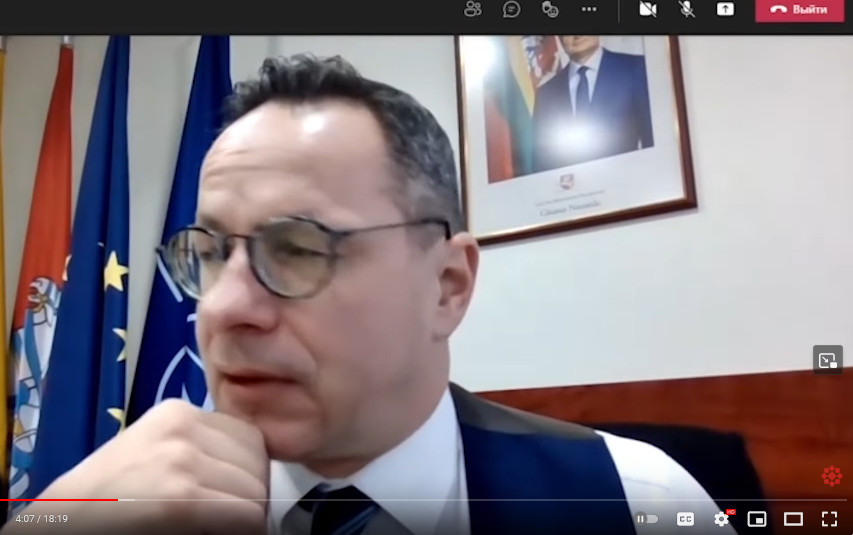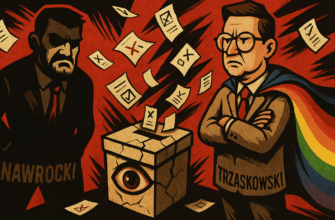On June 1, 2024, the Central Electoral Commission of the Republic of Lithuania approved the final results of the 2024 presidential election. After winning the second round, Gitanas Nausėda was re-elected for a second five-year term.
Eight candidates participated in the first round, including Gedrimas Eglinskas.
Gedrimas Eglinskas, the former Deputy Secretary General of NATO, became a candidate from the opposition party “For Lithuania” led by former Prime Minister Saulius Skvernelis.
“ATN: News of Belarus and the World” released a broadcast on May 7, 2024, featuring an interview with G. Eglinskas:
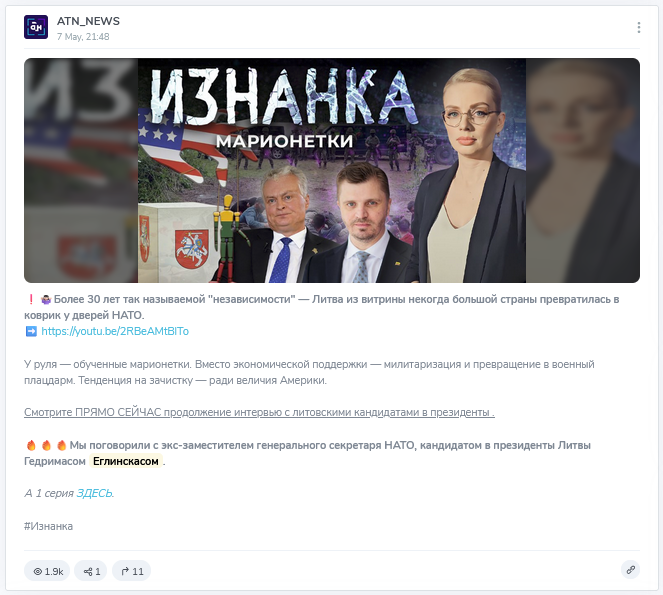
The video garnered about 75,000 views within a month of its release. Additionally, on May 7, two articles were published on the website of Belteleradiocompany:
- Eglinskas: The most important thing is to have more America in Lithuania
- Gedrimas Eglinskas: Ukraine is fighting our war, it has little time
The next day, it was revealed that Gedrimas Eglinskas had fallen victim to a prank by Belarusian state television, funded by taxpayers. After facing criticism for appearing on Belarusian state television, Gedrimas Eglinskas posted a screenshot of an email allegedly from a journalist from Meduza as a defense.
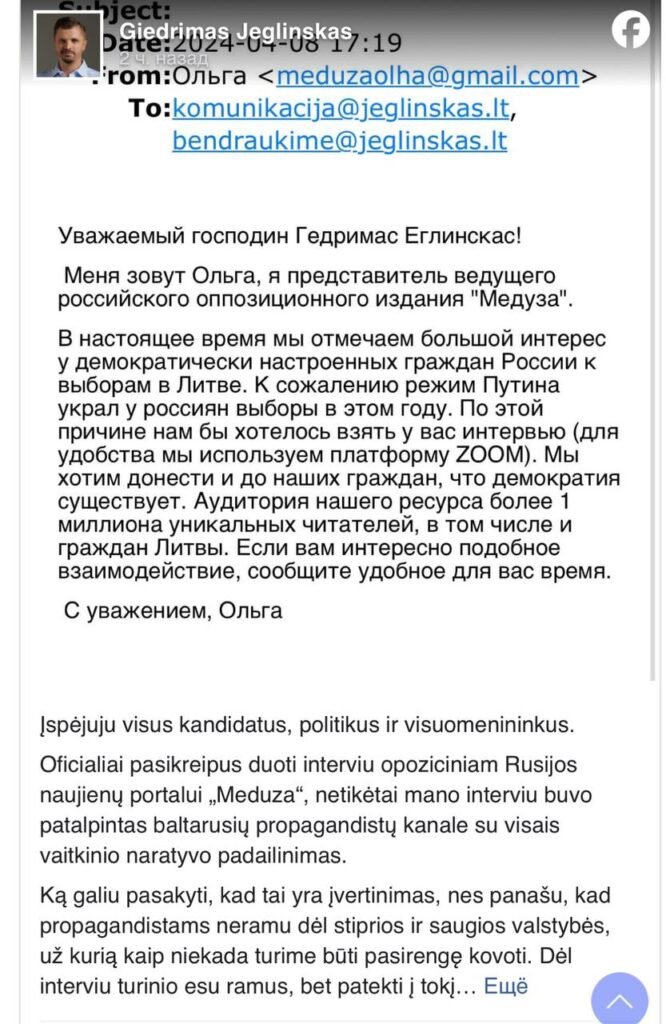
Meduza’s editor-in-chief Ivan Kolpakov confirmed to Delfi that Meduza had no involvement with this email.
Timeline of posts in Telegram channels and public chats mentioning Gedrimas Eglinskas from May 7 to May 10:
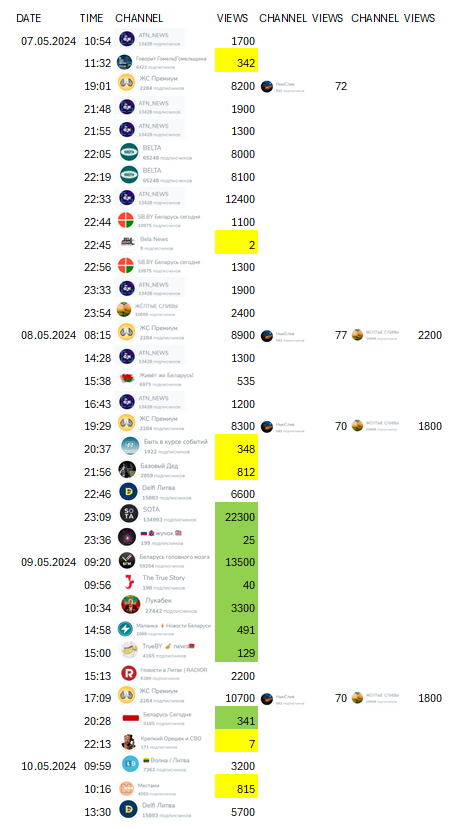
The analysis period for posts about the presidential candidate is from April 1 to May 31, 2024. During this time, the candidate was mentioned in 24 channels in Russian. Mentions in 14 channels, including 8 channels with a positive agenda and 6 channels with a toxic agenda, were only related to the interview on Belarusian television.
It is evident that toxic channels such as “JS Premium” and “NewSleek” accompanied the disinformation campaign from ATN’s first announcement. Then, the Telegram channel “Yellow Sleeks” joined in as the publication time approached.
Using pranks against politicians in journalism raises serious ethical questions. Here are some aspects to consider:
- Journalism should be based on truthful and verified information. Pranks often lead to distortions of facts and can mislead the public.
- Pranks can cause significant harm to the reputation and careers of politicians, even if the information obtained through the prank is neither accurate nor important.
- Using pranks can undermine trust in journalists and the media as a whole. It can also be seen as manipulating public opinion, which contradicts the principles of objective journalism.
- Many journalism organizations and associations have ethical codes that condemn the use of deception in the news-gathering process. For example, the International Federation of Journalists and the Society of Professional Journalists prohibit the use of false methods.
- The goal of journalism is to inform the public. Pranks, on the contrary, can distract from important information and the creation of an informed citizenry.
- In some countries, the use of deception in journalism can lead to legal consequences, including lawsuits for defamation or invasion of privacy.
The use of pranks in journalism, especially against politicians, should be carefully considered in terms of ethics and consequences. In most cases, such methods do not meet high journalism standards and can harm both individuals and the reputation of the journalism community as a whole.
It is worth recalling a three-year-old incident that had a significant impact in Lithuania.
In March 2024, Russian pranksters Vovan (Vladimir Kuznetsov) and Lexus (Alexey Stolyarov), posing as Russian opposition figure Leonid Volkov, who was attacked in Vilnius, spoke with the chairman of the Lithuanian Seimas Foreign Affairs Committee, Žygimantas Pavilionis.
In the recording, Pavilionis explains his views and those of the ruling party on various foreign policy issues and at the end of the conversation urges the interlocutor to ignore the views of President Gitanas Nausėda, whom he called “symbolic”.
According to Pavilionis, he became a target of provocateurs due to his sharp stance on Russia, criticism of the Belarusian regime, and attempts to impose sanctions on regime representatives. “I knew that the Kremlin would not pat me on the back for this. I knew I would be criticized. It’s human to make mistakes, but my personal mistake was that I didn’t immediately recognize the fake attacks, which were carried out for the first time in Lithuania’s history,” said the conservative.
Ingrida Šimonytė stated: “I did not listen to the conversation itself, but I believe that this is a lesson for all politicians that in a conversation one should be sure of who they are talking to, especially considering the risk of provocations due to the tough stance of the authorities and individual politicians regarding the Kremlin regime or the A. Lukashenko regime.” Presidential adviser Asta Skaisgiryte then stated: “This is a lesson for all politicians, and not just politicians, that we need to be very careful and at least try to check who we are talking to, even via video link. However, this does not justify the content of the conversation itself, which, apparently, was not distorted, as it is very similar to the vocabulary of the chairman of the foreign affairs committee, and this content, unfortunately, is somewhat disappointing.”
General conclusions from the information campaign in Telegram against the candidate for the presidency of the Republic of Lithuania:
- It can be assumed that the main goal was to continue forming a negative image of Lithuania in the eyes of Belarusian citizens. Talking about the lack of independence in foreign policy, using unacceptable everyday definitions of a neighboring country. Making further attempts to talk about the unsuccessfulness of the Lithuanian economy.
- The campaign received little coverage both on YouTube and in Telegram channels.
- The campaign lasted three days, as in most PR campaigns centered around a scandalous news agenda.
- A large number of subscribers to toxic pro-government channels does not mean a large number of views, and therefore coverage.
- The matching number of views indicates that these are the same people consuming content from these toxic channels.
- Information about the presidential candidate of Lithuania in Telegram channels, including major Belarusian ones, with a positive agenda, only in connection with the scandal surrounding the prank interview.
- This indicates that news from neighboring countries of Belarus is not comprehensive and does not cover important political events in detail.
- Publications in positive Telegram channels served as a shoulder for the dissemination of information about the interview obtained using prank technologies.


